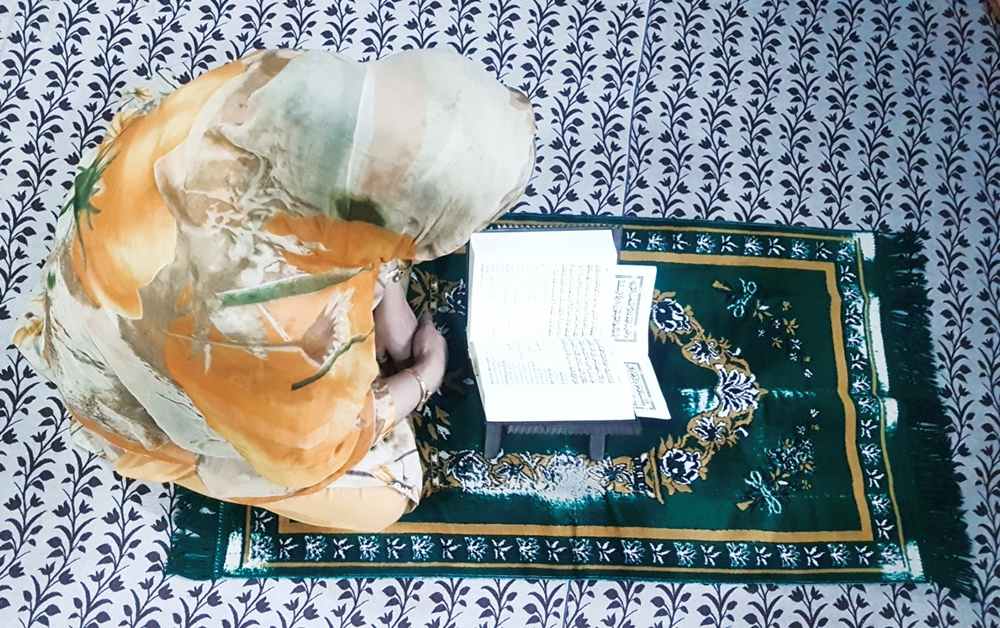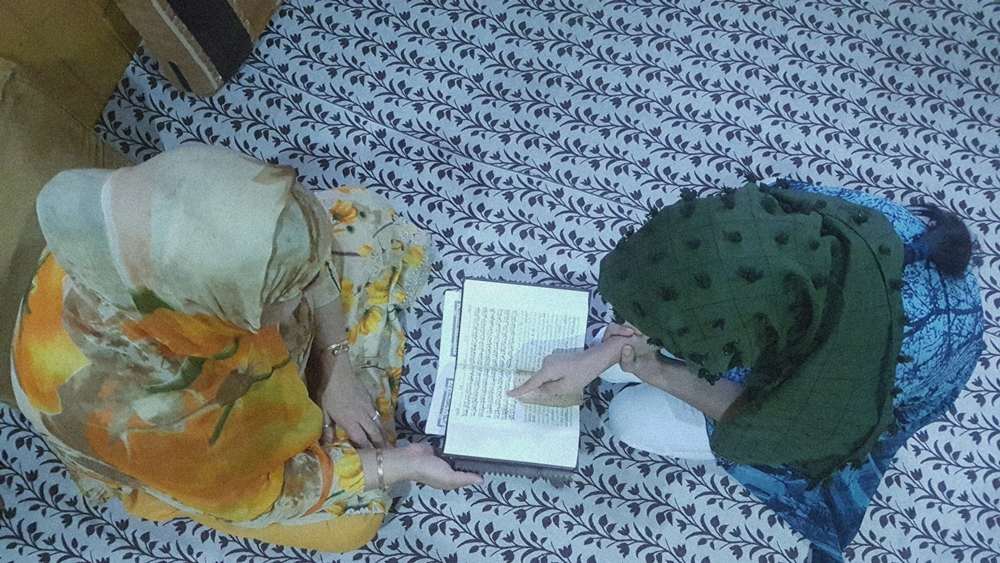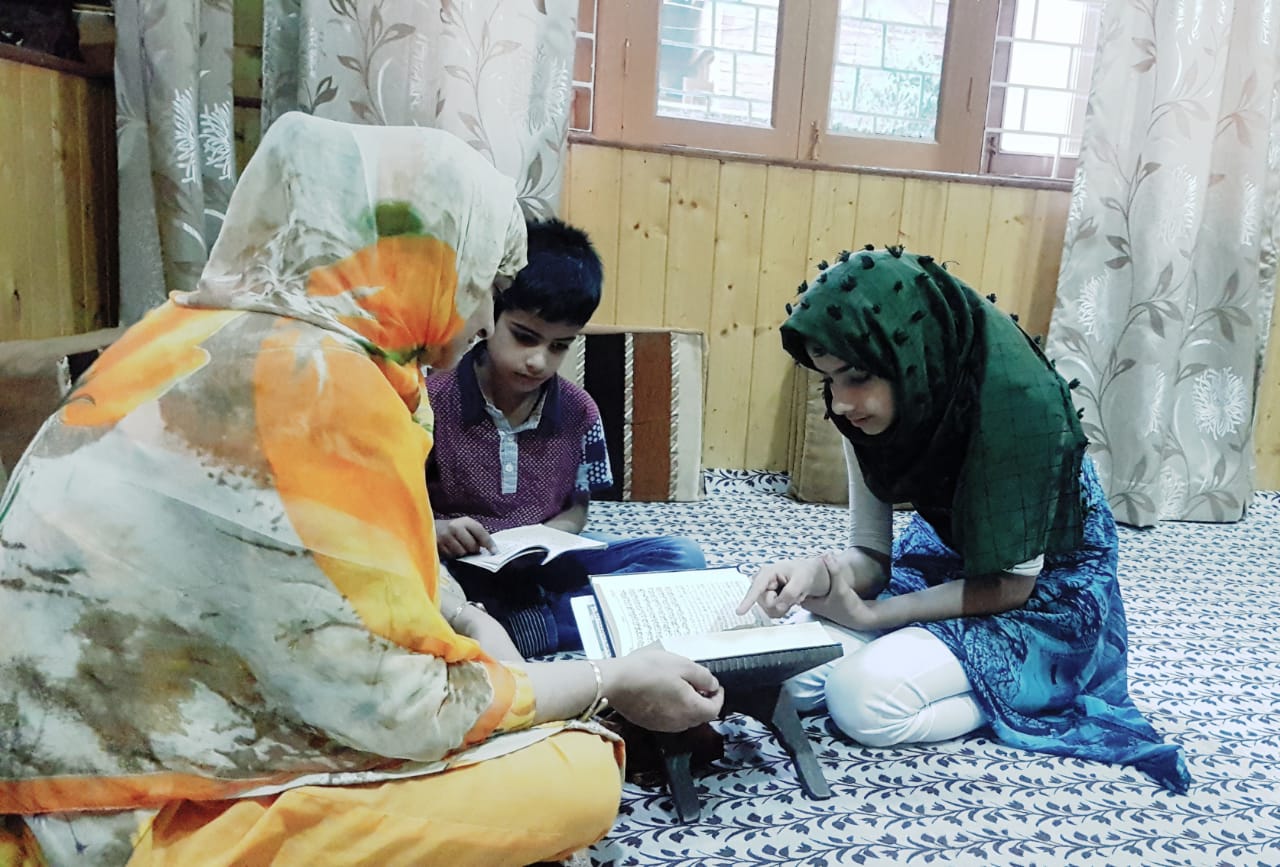‘Otanji’: That Kashmiri Mother Who Taught Book of God

Sadaf is a Mass Communication graduate from the University of…
In Kashmir of yore, a ramrod motherly figure would teach the Holy Quran to children with a sense of religious authority. But now, she has become a heartbreaking memory of long lost time.
As the wave of early morning prayers reverberates in the majestic Koh-e-Maran of downtown Srinagar, Mehjabeen’s heart finds solace in the Covid times, when all the spiritual centers either remain closed or are advanced to, with a strange, never practiced before ‘caution’. Mahjabeen rises at the break of dawn to offer Fajr prayers and syncs her long-drawn Arabic syllables of Awraad-e-fatiah with the Imaam’s voice coming from a nearby mosque.
The 62-year-old prays for the end of the pandemic in her five daily prayers. Having been born, grown up and gotten old in a place that she lovingly calls “epicenter-of-Kashmir-history”, resident of Ael Masjid Eidgah, Mahjabeen has never witnessed a spiritual threat as she is faced with now.
She plucks out her place of recourse from a part of history when not only the Muezzins’ prayers reverberated through Sultan’s shrine but when high pitched sound of shanks pierced through the dark as Pandits would do their rituals throughout Saturday nights around the downtown area.
Mahjabeen folds her prayer rug into neat creases, blows chanting durood and rests her back to unfold the nostalgia over the beads of her rosary in her hands. She travels back to a time when she felt spiritually elated and lifted many others spiritually up with her- a time when she was called Otanji.

Born in Narwor area of Eidgah, Mahjabeen says that she misses the time when the life of downtown was abuzz with the merriment of children and recitations of Quran. Women taught the Quran to these children in every second household of the area which would also become a tzchathall, seminary, to everyone coming to learn from Otanji of the house. It was also a time when Kashmiri Pandits and Muslims lived side by side.
Support Our Journalism
You are reading this because you value quality and serious journalism.
But, serious journalism needs serious support. We need readers like you to support us and pay for making quality and independent journalism more vibrant.
“There was no definite time for a tzchathall to start in the day unlike we see in darsgaahs or schools today. Children would come any time, read the Quran and leave anytime they would wish.”
A tzchathall of the days of Mahjabeen’s nostalgia gave a safe socializing space to children- girls and boys alike who would spend days chattering, playing and learning Quran together.
Following reels of wood inside houses to not be out of the game Het het, playing inside the squares drawn from coal in the compound of tzcathall, Sazz long was another favourite game of the kids.
“I remember in adjacent areas of Narwor where there were Pandit families, their kids would come to these tzchathaal just to play with their Muslim friends.”
Mahjabeen started learning the Quran as a three-year-old from her father Ghulam Hassan who was a teacher of the Quran and also Imaam of a local mosque in the adjacent area of Kawdor. While her father taught many kids of the locality, Mahjabeen was sent to her neighbour’s tzchathall in a muddy little house to learn the Quran further.
“I was merely three or four when I was sent to my neighbour’s, they were a duo of mother-in-law and daughter-in-law called Boabe Teath and Aape Teath who taught the Quran to hundreds of kids.”
Mahjabeen recounts how Boabe Teath would enquire about her from her mother on days she wouldn’t turn up in her tczathall.
“There was a freshwater body separating our houses in the space where constructions would start later, Boabe Teath would call my mother out loudly from the other side asking about my absence. Everyone called me Laaleh and I still hear it in my head when she would loudly ask my mother Hatav ye Laaleh kon aayi az Quran parni (Why didn’t Laaleh come today to read Quran?),” Mahjabeen’s smile grows into a full arc of a mesmerizing memory.
Inspired by the devotion with which Boabe Teath and Aape Teath taught kids, Mehjabeen would imitate their ways of teaching the Quran as a kid at home. “I remember both of them so vividly, and how they used to spin the yarn, do house chores and teach Quran to kids.”
As Mahjabeen’s father would come from his office, he would go to teach Quran to Kawdor and send his daughter to his neighbour’s.

“A very elder person used to come to my father to learn Quran at home. He was a government officer in some department and hadn’t read the Quran. I was a teenager then when father had to go away from home for a month and he handed me over the task of teaching the Quran to the official. I would feel edgy while teaching the Quran to a person much elder to me however that was the time from where I would continue teaching and become Otanji myself.”

Mahjabeen’s face beams recalling the joy when every other house was a tzchathall with otanji in it and a time when every house of downtown was so closely knit with the teaching of Quran at the helm of the closeness.
“That time was very different than the present, people were grounded in simplicity and devotion and they felt peace in their lives. Kids would not be sent to schools unless they had completed the Quran first.”
The time which the elder most generation lived as a period of contentment would be the last of its kind they would see, following a political upheaval which shattered many such beloved traditions to smithereens. Mahjabeen back then felt more important as a part of the society where she would learn and teach the basics of Islam, biographies and sayings of the Prophets and much. It was also the time when celebrations on Khatm-e-Quran were another festivity just like Eid and those who learned the Quran claimed much respect in the society.
“I remember every other day when kids would memorize a portion of the Quran, there would be celebrations in the area. A kehwe samovar would brew in tzcathall as kids would start recitations of the Quran.”
Mahjabeen imagines if a choice were given to her between what she calls the ‘knowledgeable’ times of present and the ‘simplistic’ times of past, she would choose the latter.
“As important as the epistemic traditions are these days, I would still choose the past in which we knew nothing of the phonetics of Quran and much we know today but I do not see that devotion to the book of God in this knowledge society, present in the good old days which many people of the younger generation disqualify as a time of ignorance.”
The Otanji of old days shares that while searching for matches in marriage, the knowledge of the Quran would be the first question asked about.
“Emis kotah Quran chu yaad (How much portion of the Quran has the person memorized) would be the first question that would be asked before embarking on new relations. After the marriage, there would be a definite day on which the newly married girl would be asked to recite portions of the Quran from her memory. It was also a separate event in a marriage ceremony.”

Mahjabeen has taken many such recitation tests of girls she taught as Otanji. She denounces today’s practice in which brides hang small copies of the Quran around their necks encased in silver boxes. “It is a mere symbolism these days, brides of the older days hung Quran closer to their hearts because they would keep it as close as before and forever in their lives.”
She recalls her father Ghulam Hassan being an avid reader of Islamic literature who had piled up periodicals of Molvi Muhammad Farooq on Tableeghe Islam from his library. As Jamaat-e-Islami schools also inculcated a sense of religiosity, a turn in history forced them shut.
Soon, a wave of private schools dawned on Kashmir. With that, says Mehjabeen, sensibilities started to change. And after seeing the in-between time of bloodshed, the tzchathall tradition became a heartbreaking memory of long lost time.
To help us strengthen the tradition of quality reading and writing, we need allies like YOU. Subscribe to us.
Mountain Ink is now on Telegram. Subscribe here.
Become Our Ally
To help us strengthen the tradition of quality reading and writing, we need allies like YOU. Subscribe to us.
Sadaf is a Mass Communication graduate from the University of Kashmir. Chronicling events in narrative writing interests her.













